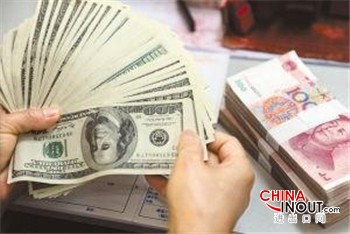北京方面放寬了對中國企業(yè)尋求海外融資的限制。此前中國外匯儲備在8月份出現(xiàn)創(chuàng)紀(jì)錄下降。
對入境資金放寬資本管制的決定有助于提振資本流入,,目前中國股市大幅下跌和經(jīng)濟(jì)不斷放緩正在加劇人們對于資本外流的擔(dān)憂,。
根據(jù)國家發(fā)展和改革委員會(NDRC)在其官網(wǎng)上發(fā)布的一份通知,,這家中國規(guī)劃機(jī)構(gòu)已推出新政策,,讓中國企業(yè)更容易獲得外幣銀行貸款,或者發(fā)行期限超過一年的人民幣債券,。
“新政策將簡化中國實體發(fā)行離岸債券的過程,。只要是在批準(zhǔn)的外債額度內(nèi),它將在債券發(fā)行的時機(jī)和數(shù)量方面給予中國企業(yè)靈活性,,”穆迪(Moody's)大中華區(qū)信用研究部門負(fù)責(zé)人鐘汶權(quán)(Ivan Chung)在香港表示,。
以往,企業(yè)的每一筆交易都需要審批,,但現(xiàn)在它們只需要向監(jiān)管機(jī)構(gòu)備案,。
“就像滬港通(Shanghai-Hong Kong Stock Connect)一樣,此舉是向著讓中國金融市場與世界接軌的方向邁出的又一步,,”鐘汶權(quán)表示,。
中國的外匯儲備在8月份下降2.6%,至 3.557萬億美元,,在一個月里下降940億美元打破了單月下降紀(jì)錄,,原因是中國人民銀行(PBoC)拋售了部分儲備以支持人民幣。
國際清算銀行(BIS)數(shù)據(jù)表明,,外資銀行對華債權(quán)在2015年頭三個月萎縮了770億美元,,反映出它們不愿放貸。
“在某個層面上,,即使在波動性和不確定性上升之際,,中國也沒有失去推進(jìn)市場自由化的意愿,,這一點令人鼓舞,。它似乎表明,中國領(lǐng)導(dǎo)人明白,,市場力量暴露的問題,,也可以通過市場力量來解決,,”野村證券(Nomura)亞洲首席股票策略師邁克爾錠爾茨(Michael Kurtz)在香港表示。
不過,,他表示,,鑒于“各方預(yù)期人民幣將進(jìn)一步貶值,預(yù)期美元借貸成本將不斷上漲,,而國內(nèi)借貸成本將不斷下降”,,尚不清楚中國公司會否急于利用更加開放的海外借款環(huán)境。
市場正在等待美聯(lián)儲(Federal Reserve)今日作出是否在近10年來首次提高美元利率的決定,。
與此同時,,據(jù)一些市場參與者向英國《金融時報》反映,中國正考慮在國內(nèi)大宗商品市場實施針對自動交易的限制,。
新的法規(guī)將對自動交易商作出定義,,要求他們披露身份和資金來源,并限制他們可以在期貨市場下單執(zhí)行的交易數(shù)量,。(中國進(jìn)出口網(wǎng))

Beijing has eased the restrictions on Chinese companies seeking to raise funds overseas, after a record monthly decline in China’s foreign exchange reserves in August.
The decision to loosen capital controls on inbound funds stands to boost capital inflows at a time when big domestic stock market losses and the slowing Chinese economy are heightening concerns about capital outflows.
China’s planning agency, the National Development and Reform Commission, has made it easier for Chinese companies to obtain foreign currency bank loans or issue renminbi bonds with a term of more than a year, according to a statement on its website.
“The new policy will simplify the process for Chinese entities to issue offshore bonds. It will give Chinese companies flexibility in terms of timing and the amount of bonds issued as long as it is within the approved foreign debt quota,” said Ivan Chung, head of Greater China credit research at Moody’s in Hong Kong.
Previously, companies needed approval for each deal but now they are only required to register with the regulator.
“Like Shanghai-Hong Kong Stock Connect, it is another step forward in integrating the Chinese financial market with the world,” Mr Chung said.
China’s foreign exchange reserves fell 2.6 per cent to $3.557tn in August, a monthly $94bn dro that was the sharpest on record, as the People’s Bank of China sold down some of its stockpile to support the renminbi.
Data from the Bank for International Settlements show that foreign bank claims on China shrank by $77bn in the first three months of 2015, reflecting their reluctance to lend.
“On one level it’s encouraging to see that China has not lost its appetite for pro-market liberalisation, even as volatility and uncertainty have risen. It suggests the leadership understands that problems revealed by market forces can be addressed by market forces as well,” says Michael Kurtz, chief Asia equity strategist at Nomura in Hong Kong.
However, he said it was not clear that Chinese companies would immediately embrace the more open overseas borrowing environment “given expectations for a depreciating renminbi and for rising US dollar borrowing costs versus falling domestic borrowing costs”.
Markets are awaiting a decision from the US Federal Reserve today on whether to raise interest rates for the first time in nearly a decade.
Meanwhile, China is considering implementing restrictions on automated trading in its commodity markets, according to market participants who spoke to the Financial Times.
The new regulations would define automated traders, require their identity and source of funds to be disclosed, and limit the number of trades they could place in the futures markets.











